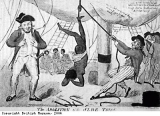The Kimber case
One Bristol ship’s captain became a household name during the Abolition campaign to end the slave trade. John Kimber was master of the slave ship the Recovery on her 1791 voyage to New Calabar (now in Nigeria, West Africa). He bought about 300 enslaved Africans. On the voyage across the Atlantic Ocean from Africa to the island of Grenada in the Caribbean, Kimber had punished a female slave. She was refusing to eat. The girl died. The surgeon on the ship, Thomas Dowling, had told the Abolitionist campaigner William Wilberforce about it. Wilberforce, speaking in the House of Commons during a debate on the slave trade, accused Kimber of murder. This was widely reported. The newspaper, Felix Farley’s Bristol Journal for 7 April 1792, published a report of the debate. Kimber placed an advertisement in the Bristol paper the next week. He denied the assault and promised to tell his own side of the story, asking that people did not judge him until they had heard his version of events. The advertisement is pictured here.
Kimber was tried in the High Court of the Admiralty in June, and Felix Farley’s Bristol Journal reported the case. No doubt other newspapers also followed the case, as it was of more than local interest. Kimber was accused of assaulting the girl, by suspending her by the ankle whilst beating her with a whip, and that she died of injuries received from this ‘punishment’. Various witnesses, including the Bristol merchant Walter Jacks and a fellow captain, Phillips, spoke for Kimber. The witnesses against him, the surgeon Dowling and the 3rd Mate Stephen Devereaux, were accused of making up the case against Kimber because they had quarrelled with him. It was claimed that the girl had died of natural causes.
The case was of great interest, and not just in Bristol. This cartoon was published by the London satirical cartoonist called Cruickshank. A booklet of the trial proceedings was published by Kimber’s friends, there is a copy held by the Bristol Central Library.
And what was the result? The jury found Captain Kimber not guilty of murdering the slave girl on his ship. Those who spoke against him, Dowling and Devereaux who were also on the ship, were charged with perjury (purposefully lying in court after swearing to tell the truth). The Abolitionist campaigners were not convinced by the outcome. William Wilberforce, the force behind the Abolition campaign, thought that the judge favoured Kimber. He also felt that the prosecution lawyers had not done their job properly, and that Kimber was guilty.



